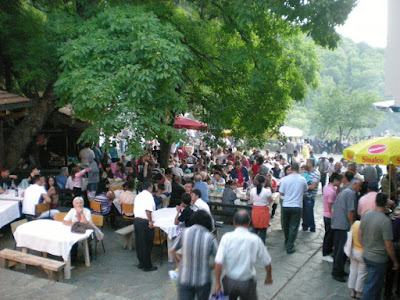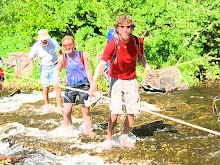As holiday travel goes, even for cheapskate backpackers like us, this was a new one: we'd hitched a ride across Transylvania (central Romania) with a bus of second graders on a school field trip. No, there's no punchline; the driver was playing something like European "Jock Jams" over the bus speakers and a group of rowdy little boys bounced around behind us, singing along as if they were in fact seated in a soccer stadium and not row 17 of a chartered bus. A few parent-chaperones chatted in front of us and David, our friend and a teacher at this particular school, strolled the aisle taking pictures of drowsy kids. Nothing unusual here.
Actually, these kids and our bus trip are a nice object lesson on the world of Transylvania, most often associated with full moons, Dracula, and cloud-enshrouded castles. See, everyone on that bus was speaking German, not Romanian, because they are the descendents of the Saxon Germans who settled in the region centuries ago. The communities they built, called Transylvania by Romanians and most outsiders but referred to as Siebenburgen by Germans for the seven towns that encompass the area, have been impressively preserved and today stand as a beautiful pocket of Central Europe in the heart of the east.
The bus ride from Sibiu to Sighisoara (I'll use the Romanian names for the towns, since that's what shows up on most maps) wound through lush green hillsides. When the vantage point was right, the snow-capped Carpathian Mountains could be seen in the distance. In a grand arc, this range swirls in from the north, sealing off Transylvania from the plains in southern Romania.
The towns in Transylvania large and small have a conspicuously small number of ugly communist-era concrete buildings. In addition to Sibiu and Sighisoara, we also stopped in Brasov, and found all three exquisitely charming with their cobblestone lanes, baroque facades and Gothic churches.
 Main square, Sibiu
Main square, Sibiu
 Clock tower, Sighisoara
Clock tower, Sighisoara
All this charm comes cheap: due to the global economic crisis, the Romanian currency, the lei, has lost half its value from this time last year. A tough situation for this newly-minted European Union member, but nice for Western tourists. In other words, you can visit Dracula's castle and buy the black t-shirt depicting some oversized incisors and the words "Somebody in Romania loves me." Or perhaps you'd like to pose with the life-sized doll of Vlad for only two bucks?
Vlad Tepes, a much-celebrated fifteenth century prince known for his exceedingly cruel punishments over those he ruled, was the probable basis for Bram Stoker's vampire. Vlad was born in Sighisoara; there's a plaque on the side of the building, now an upscale restaurant called, you guessed it, "Vlad-Dracula." We didn't go in, but I'd bet their Bloody Marys are fantastic.
We like to travel with Trivial Pursuit cards; they help pass the time during travel delays or down time between museums. Here's something that would fit nicely into the History category (and for a yellow chip): What country's parliament building was only the second to have air conditioning, maintained by placing giant blocks of ice in the ventilation system? The answer is Hungary and the city is Budapest, which we visited before our stay in Romania. Situated on an especially wide stretch of the Danube River, Budapest feels both quite large (its population stands at over 2 million) and wonderfully small. Towering churches and palaces are complimented by small, leafy streets and a cafe-oriented, casual speed of life.
No doubt our favorite site was that parliament building. Built in 1902 in the Gothic style, its elegance--or maybe opulence is a better word--is hard to overstate. Seated along the Danube like a crown jewel, the building's exterior brilliance is matched only the interior decor. Let me put it to you this way: the main hall's support beams are painted using 22-carat gold flakes. When eleven
thousand of these gold flakes are stacked, they reach only one millimeter high; the artists runs the brush over his face to create static electricity in order to lift the flakes without damaging them as he places them on the...support beams. I can only assume the janitorial staff cleans up with diamond-encrusted mops.
 Overlooking the Danube from Buda Castle
Overlooking the Danube from Buda Castle
 One of the many memorials to the Soviet Army
One of the many memorials to the Soviet Army
A bronze statue watches Parliament
Walking the streets of the city was a real treat and we enjoyed visiting the Buda side of the river (the city was originally two municipalities, hilly Buda and flat Pest) to see the medieval castle and enjoy views of the river. But an unexpectedly good time was found at the Terror Museum, which I assure you is not so cheesy as the name suggests. Located in a fairly average-looking building along the city's most famous street, the museum documents the crimes perpetrated on the Hungarian population by both the WWII-era fascist regime and the post-war, Communist government. In both cases, state secret police housed their headquarters there, where thousands of people were detained, tortured and executed.
The man we stayed with in Budapest is Hungarian on his mother's side. His grandfather once told him that everyone knew what was going on inside that building and whenever he would pass it on the street he would remove his hat in respect to the victims.
Constructed only six years ago, the Terror Museum is perhaps the most stylish and persuasive museum we've ever visited. Its designers did a wonderful job combining images, light, sound, and period pieces to create a very compelling and disturbing picture. Indeed, more than a museum, this is a place where a country is coming to terms with its past. Point: as the tour ends and homage has been paid to the victims, visitors enter a narrow passageway filled with photos. Below each photo is a name. These are the criminals, the Hungarian men and women who took part in the shadowy terrorization of their own population. What jumped out at us about this display is that many of these people are still living. I think this museum took great courage.
Well, I've just about gone on as long as the Danube, so I'll conclude. As always, more photos can be seen by clicking on "Our Photos" on the right sidebar. This was a great getaway before the summer rush. Healthy Kids Day Camp is now in full swing with preparations and the weather has turned hot. Summer, we welcome thee with open arms!












































